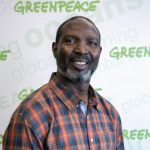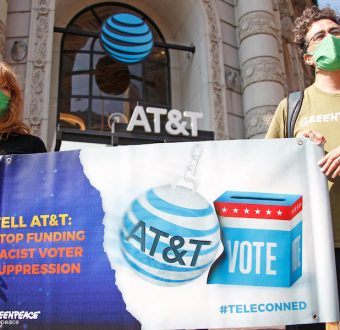We believe that we can’t have a green and peaceful planet without justice: climate justice, economic justice, and racial justice. And we certainly won’t achieve this without a movement that is big and diverse enough that everyone has a voice. Out of that belief, Greenpeace built a campaign in 2013, focused on democracy, to fight the political processes and policies that stand between us and a more peaceful and just future.
Over the last 50 years, many of the communities we work alongside to fight for environmental justice also face racial and economic injustice, disenfranchisement from democratic processes like voting, as well as the daily threat of violence from those who are supposed to protect them. If we are silent about it, we are complicit with it.

Declaration for American Democracy host a rally in support of S.1 calling on Mitch McConnell and others in Congress to stop their obstruction of this vitally important bill to save our democracy. The Senate plans to bring S.1 the For the People Act to the floor for a vote, a transformative piece of legislation that can protect voting rights, end gerrymandering, and push back against the influence of big money in politics.
As we hurtle towards climate chaos, we need people-power more than ever
The premise of the Democracy Campaign is to go directly at roadblocks in our way: attacks on progressive peoples’ movements, the racist and white supremacist systems that uphold these injustices, the influence of money in politics, policies that prevent people from voting or conspire to make their vote count for less and the systems that prevent people from exercising their rights to free speech and association.
While there are many issues we focus on, here are some highlights of our projects:
Strengthen our democracy through protecting our freedom to vote and getting dark money out of politics

Greenpeace US activists demand AT&T (an American multinational conglomerate holding company) not wreck our democracy by funding racist voter suppression. The activists passed out flyers while an animation calling on AT&T to stop funding extremist politicians who sponsor racist voter suppression bills plays on a digital billboard in Washington, D.C.’s iconic 7th & H Street intersection in the Chinatown-Gallery Place neighborhood—right above D.C.’s flagship AT&T store.
From unprecedented amounts of dark money flooding our politics, to restrictions on our freedom to vote that disproportionately impact Black and Brown communities, we’ve seen the harm that happens when our politics are not people-powered. Voting rights preserve all rights, whether it is our rights to a living wage, healthcare, equal housing opportunity, or a clean environment. Our democracy should be our best tool for advancing climate solutions, but it has been hijacked by fossil fuel interests. Millions of people, especially Black and Brown communities, are blocked from participating because of restrictions on voting rights and the corroding influence of corporate money in politics. Attacks on voting rights disproportionately harm the most vulnerable communities in our country, especially BIPOC communities who endure the brunt of pollution and the effects of climate change.
But we have an opportunity to make a change and strengthen our democratic principles as the Voting Rights Act intended. There is no question that our democracy is at a tipping point and the John Lewis Voting Rights Advancement Act (H.R. 4) and the For the People Act (S.1) are our best chance to make a better future for all of us, no exceptions. Together, these bills are the most important pieces of civil rights legislation since the Voting Rights Act. As part of a major national coalition, the Declaration for American Democracy, we help organize rallies with public officials, publish hard-hitting research, expose corporations who are funding the disenfranchisement of voters, and so much more.
Fighting for peoples’ right to protest and dissent
Black, Brown, and Indigenous communities have shown what people-power looks like at Standing Rock, Ferguson, and beyond. Record numbers of people voted during the last election to make their voices heard. Yet extremist lawmakers and the corporations that sponsor them are using tactics to squash protests and disenfranchise voters in hopes to divide and distract us while they block popular legislation including democracy reform and policies that will help our planet thrive. They have seen what we are capable of when we come together and want to stop us at all costs so that they can hold on to their power and their dying toxic industries.
Continuing a dangerous trend, state legislatures are introducing anti-protest legislation at a rapid pace this year. The bills would increase criminal penalties for vague offenses like unlawful assembly, trespass, and obstruction. Many seek to redefine what constitutes a riot, often by expanding what conduct amounts to a felony. Laws in Florida and Oklahoma even shield drivers from liability for hitting protesters with their cars. These bills are designed to chill the speech of activists, by frightening people from attending the next protest—a warning accomplished by their mere introduction, whether or not the bills ultimately become law.
We work with state and local organizations fighting these bills, and expose who is behind this assault on our democratic right to free speech. According to a recent investigative report following a new Greenpeace USA report, major corporations are lobbying for these bills behind the scenes, and handing out campaign contributions to local lawmakers who introduce them.
But that is not all, the same corporations, and other individuals in power seek to silence activists by entangling them in costly and lengthy legal battles known as SLAPPs (Strategic Lawsuits Against Public Participation). Greenpeace itself has been a target of two such lawsuits, but we are not afraid. As a founding member of the Protect The Protest task force we have combined our expertise and collective power to protect the free speech of public interest advocates in the United States. An attack on one is now an attack on all.
Racial justice is climate justice

Activists at the rally. Black Voters Matter along with Long Live GoGo, The Live Movement, Greenpeace, ShutDown DC, and other local and national organizations at the U.S. Chamber of Commerce for a live concert and rally in support of voting rights.
The environmental community must not stay silent in the face of systemic injustice. We must act and speak in solidarity with the Black community and the Movement for Black Lives. Fighting for a green and peaceful future includes speaking out against the unjust, racist, and systemic violence facing Black people in the US. Being silent is not an option.
If you’re wondering why the climate movement and racial justice are so linked, think about this: white supremacy and institutional racism rears its ugly head in countless ways. Housing access, health outcomes, political power, and access to education for example. It manifests how and to what extent people are affected by climate change. And It decides how communities are policed, and whether or not it is safe for Black people to exist, take up space, or thrive.
We cannot have climate justice without racial justice.
Greenpeace supports the Movement for Black Lives policy platform and stands in solidarity with the victims of racial violence who deserve justice, understanding, and healing. We stand in solidarity with those who seek peaceful and strategic solutions to systems of power and privilege and their violent expressions. And we stand in solidarity with our Black Lives Matter allies demanding accountability for the victims of police and other forms of state-sanctioned violence. We believe that the success in Greenpeace’s work is deeply interconnected with the success of those working for racial, social, and gender justice.
Justice is an integral part of our work — it’s an underlying value of Greenpeace as an organization and underpins our Democracy campaign work. Injustice interferes with all aspects of people’s ability to live, from access to clean water to participating in democracy. Working at the intersection of democracy and the environment is key to creating a better and more just world.
There are two paths. One takes us deeper towards crumbling democratic mechanisms and a dying planet. The other is a just democracy where all people build the solutions that protect people, and our land, air, and climate.
A healthy democracy is a precondition for a healthy environment, and a healthy democracy relies on engaged, informed, and connected civic participation. These past few years have made it crystal clear that we cannot effectively tackle the urgent and growing climate crisis of our time without fixing the unjust system that caters to corporate polluters and disenfranchises too many voters. A healthy democracy also relies on systems that aren’t an inherently white supremacist, sexist, and anti-immigrant. We demand a future that includes all voices.
—
This essay is part of our Perspectives: Our Next Fifty Years series, in which we reflect briefly on our first fifty years, but more importantly, we lay out the future we are building together—collaborative, ambitious, and intersectional. The work ahead won’t be easy, but we’ve never shied away from hard work. We continue to push for policies that recognize the contributions and leadership of marginalized groups, and we amplify their voices, looking to their wisdom to show us the way. We hold corporations accountable, demanding real action that puts people ahead of profit. We work each day with our partners to co-create green, safe planet for all beings. We recognize that equality is not necessarily justice. We demand more from our leaders, from our colleagues, and from ourselves. A green and peaceful world isn’t just a slogan—it is our mission, and it takes each one of us to get there.




